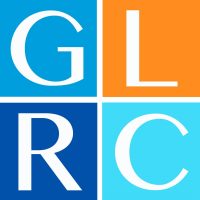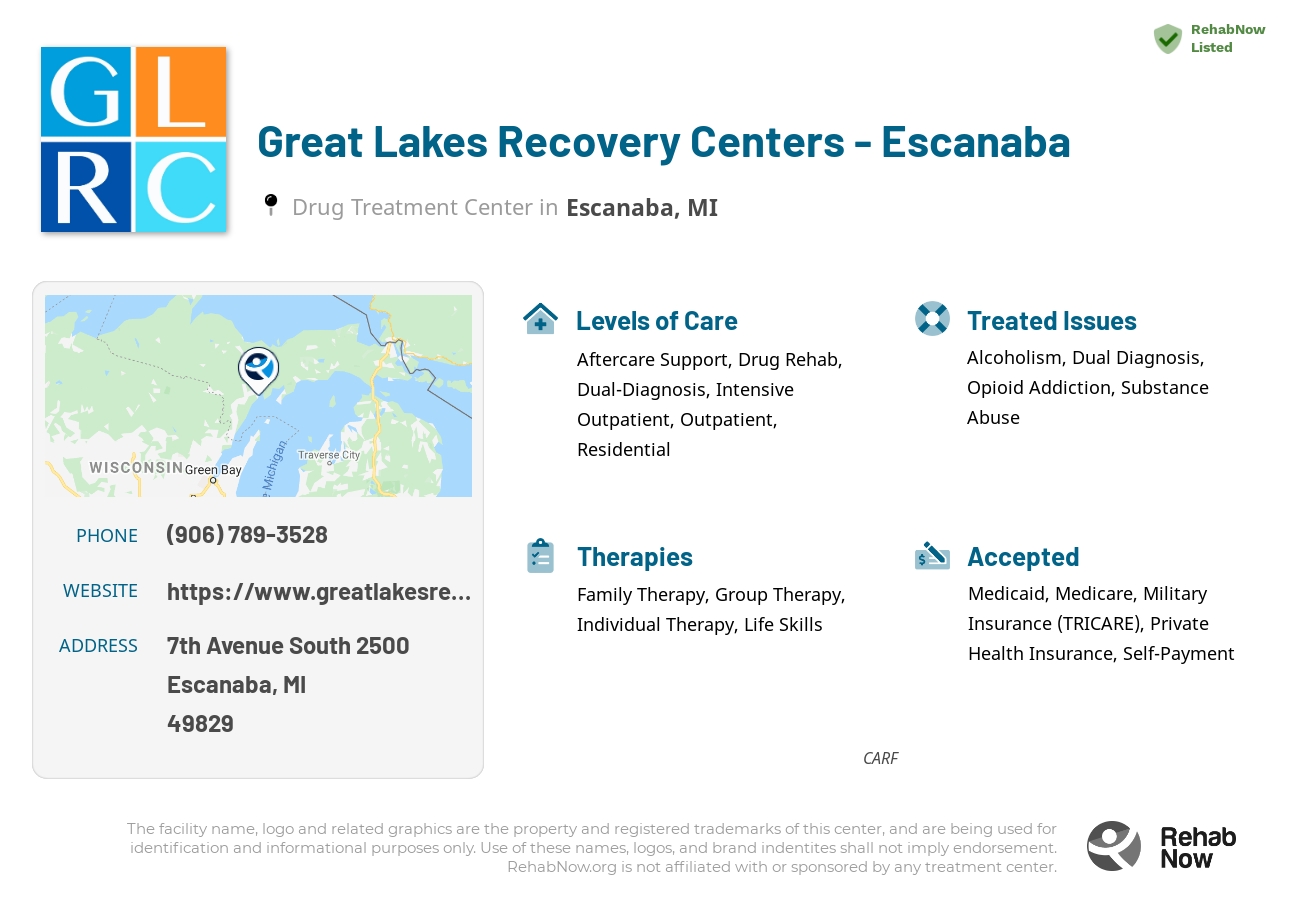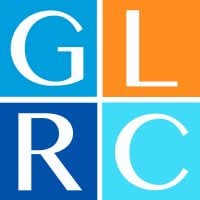Great Lakes Recovery Centers - Escanaba
Drug Rehab Center in Escanaba, Michigan
Great Lakes Recovery Centers - Escanaba in Escanaba, Michigan offers comprehensive addiction treatment services, including residential and outpatient assistance, intensive outpatient programs, aftercare support, and drug rehab, specializing in evidence-based care for substance abuse, addiction, dual diagnosis, and mental health.
About This Michigan Facility
Great Lakes Recovery Centers, located in Escanaba, Michigan, specializes in outpatient treatment for individuals grappling with substance addiction and mental health diagnoses. Emphasizing a holistic approach to recovery, this facility stands out for its commitment to fostering hope and change in a supportive environment. Their flexible, less intensive therapeutic offerings are designed to cater to a wide range of needs, including relationship conflicts, abuse, alcoholism, sexual disorders, and more.
- Holistic Approach to Treatment: Great Lakes Recovery Centers believes in treating the whole person, not just the addiction.
- Individualized Treatment Plans: Each patient receives a tailored treatment plan to address specific issues and promote long-term recovery.
- Certified and Licensed Staff: The center boasts a team of certified counselors and licensed professionals dedicated to patient care.
Great Lakes Recovery Centers - Escanaba holds accreditation from CARF, underscoring its commitment to maintaining high standards of care. This recognition highlights the quality of their evidence-based services, which are delivered by a team of qualified professionals. The center's flexible outpatient programs are designed to provide effective treatment while accommodating the daily lives of those it serves.
The center addresses a variety of issues, including alcoholism, drug addiction, relationship conflicts, and sexual disorders. Treatment methods encompass individual and group therapy, medication management, and educational workshops, among others. With a focus on outpatient care, Great Lakes Recovery Centers offers a comprehensive approach to recovery, supporting patients through every step of their journey towards health and sobriety.
Genders
Ages
Modality
Additional
Accreditations

CARF
The Commission on Accreditation of Rehabilitation Facilities (CARF) is a non-profit organization that specifically accredits rehab organizations. Founded in 1966, CARF's, mission is to help service providers like rehab facilities maintain high standards of care.
Conditions and Issues Treated
A drug abuser needs help because if no one helps them, they will not leave their vicious circle.
People who abuse drugs are likely to suffer from an addiction, which can cause serious health problems. It can also cause quarrels with people around them. It is common for drug abusers to have difficulty holding down jobs or relationships, but sometimes people around them can be quite tolerant. There are cases where the families of the drug abusers do not want to see them get any help, and the subject becomes controversial.
When it comes to helping drug abusers get sober, there are many options to choose from. It is essential to state that there is no “correct” way of doing things. People are different, and they need different types of help to get over their addiction.
Opioid addiction treatment should be done in a medically supervised drug rehab. Opioid addiction treatment will include detoxification and drug rehab counseling to help both the user and their loved ones learn how to live a successful sober lifestyle. Methadone, buprenorphine, and naltrexone are three medications that can help treat opioid addiction. Individual drug rehab counseling sessions can be helpful to discuss any questions or concerns with the drug treatment program.
When addiction and psychiatric issues co-occur, the addict’s recovery is more successful when both conditions are treated. A dual diagnosis refers to a condition in which the patient is diagnosed with two health issues: addiction and bipolar disorder.
Usually, dual diagnosis sufferers are prescribed a combination of treatments for each condition. The most common therapies are psychotherapy, behavioral therapy, spiritual counseling, 12-step programs, and medication management.
Psychiatric conditions are an obstacle to recovery because they can create roadblocks to a healthy lifestyle. Drugs and alcohol may be used as a means of self-medication, which can have dangerous consequences. Over time, addicts build up a tolerance and suffer withdrawal symptoms when drug use is stopped.
With the proper treatment, dual diagnosis sufferers can overcome their conditions and achieve lasting sobriety.
Levels of Care Offered at Great Lakes Recovery Centers - Escanaba
This center offers a variety of custom treatment tailored to individual recovery. Currently available are Aftercare Support, Drug Rehab, Dual-Diagnosis, Intensive Outpatient, Outpatient, Residential, with additional therapies available as listed below.
The Intensive Outpatient Program at Great Lakes Recovery Centers - Escanaba is for those who need intensive care but would rather get it in the comfort of their own home. The treatment programs vary in duration and intensity and can be tailored to suit the individual’s needs. IOP helps the patient to live at home and gradually get back to their routine life.
Daily trips to the hospital that provides the treatment include intensive outpatient services (IOP). The patients gradually get back to their everyday lives. IOP benefits the most when the patients have a supportive family member or friend who can encourage them in their recovery.
Individuals struggling with drug addictions can get help from several treatment options, including inpatient and outpatient programs. Outpatient drug treatment programs can also provide patients with different levels of care, usually depending on the patient’s degree of addiction.
At an outpatient program in Escanaba, a patient will attend a recovery program during the day and return home in the evening. Suppose a patient is struggling with drug addiction. In that case, an outpatient program can serve as an effective transition point during the recovery process.
Residential treatment programs are those that offer housing and meals in addition to substance abuse treatment. Rehab facilities that offer residential treatment allow patients to focus solely on recovery, in an environment totally separate from their lives. Some rehab centers specialize in short-term residential treatment (a few days to a week or two), while others solely provide treatment on a long-term basis (several weeks to months). Some offer both, and tailor treatment to the patient’s individual requirements.
Aftercare is a part of drug rehabilitation. It is also known as “post-treatment support.” Aftercare programs are available for addicts after they complete drug rehab. It is often the final step in the recovery process. The goal of aftercare is to ensure that addicts maintain their achievements in rehab and do not relapse. Professionals generally provide aftercare (including addiction therapists, physicians, social workers, psychologists) and involve individual and group therapy sessions.
Therapies & Programs
Individual therapy is a critical component of addiction recovery. It allows the patients to go deep into their core issues and discover how to handle those problems better. Therapy can be conducted in individual sessions as well as group settings. In individual therapy for addiction, the patient meets with their therapist one-on-one to focus on the underlying issues. This allows patients to open up and discuss personal topics they may not feel comfortable discussing in a group setting. This type of therapy can help develop solutions specific to each patient, which helps speed up the recovery process.
Family therapy is a crucial part of drug treatment and getting sober. It is one of the most effective ways to help addicts stay on the path to long-term sobriety. When a drug addict decides that they want to try and get sober, it takes the support of every person they love to succeed. It can be incredibly difficult for loved ones to watch an addict go through the pain and suffering of withdrawal, but by being there with them and supporting them, they can help to make sure that the addiction never returns.
One of the most important parts of family therapy is the relapse prevention plan. During treatment, therapists and doctors will often sit down with the addict and their family to develop a plan in case the addict ever feels like they want to use again. This plan should involve steps the addict and family can take together to prevent them from relapsing in the future. An addict’s family can play a vital part in helping them to avoid relapse because they can spot the warning signs and help them get back on track before it becomes too much of a problem.
Group therapy helps prevent addicts from feeling isolated or unique in their situation by offering a sense of comfort and fellowship. It also creates a forum for addicts to build their support systems and learn from each other. The group therapy sessions at Great Lakes Recovery Centers - Escanaba occur in a group setting rather than one-on-one to create a safer, controlled environment where addicts feel comfortable.
The best drug treatment centers offer various services to help addicts learn how to live without drugs. Since addiction is a chronic physical and mental illness, addicts need to learn as many life skills as possible to help them stay clean and sober.
Many drug treatment centers like Great Lakes Recovery Centers - Escanaba offer life skills activities as part of their addiction recovery programs. Examples include cooking classes, employment training, resume writing seminars, parenting classes, and computer training. When addicts have various life skills to lean on, they’re better equipped to put their addiction behind them for good.
The primary goal of life skills activities at drug treatment centers like Great Lakes Recovery Centers - Escanaba is to help addicts recover from addiction and learn how to live a useful, productive life. Life skills activities help addicts find employment, take care of their families, and give back to the community. After learning about these various life skills, addicts are better prepared to return to society and lead happy healthy lives.
Payment Options Accepted
For specific insurance or payment methods please contact us.
Is your insurance accepted?
Ask an expert, call (888) 674-0062
Great Lakes Recovery Centers Associated Centers
Discover treatment facilities under the same provider.
- Great Lakes Recovery Centers - Adult Residential Services in Marquette, MI
- Great Lakes Recovery Centers - Mountain in Iron Mountain, MI
- Great Lakes Recovery Centers - Men's New Hope House in Sault Sainte Marie, MI
- Great Lakes Recovery Centers - Women's New Hope House in Sault Sainte Marie, MI
- Great Lakes Recovery Centers - Wright street in Marquette, MI
Learn More About Great Lakes Recovery Centers Centers
Additional Details
Specifics, location, and helpful extra information.
Escanaba, Michigan 49829 Phone Number(906) 789-3528 Meta DetailsUpdated April 15, 2024
Staff Verified
Patient Reviews
There are no reviews yet. Be the first one to write one.
Escanaba, Michigan Addiction Information
Michigan has the second-highest rate of drug and alcohol abuse in the nation. Heroin is linked to more than 50% of the state's hepatitis C cases. Marijuana is the drug most often associated with crimes in Michigan, followed by methamphetamines. Opioids alone are responsible for almost 20% of all drug overdose deaths in Michigan.
Escanaba, MI, has been ravaged by drug abuse and addiction. In 2016, Escanaba accounted for 6 out of 885 total overdose deaths in Michigan. Alcohol is the most commonly abused substance in the city; marijuana is the second-most commonly used substance. Drug overdoses are rising every year. A few drug treatment options are available in Escanaba, Michigan. When comparing different facilities, consider the cost, location, and type of program offered.
Treatment in Nearby Cities
- Howell, MI (267.1 mi.)
- Auburn Hills, MI (284.4 mi.)
- Mason, MI (254.7 mi.)
- Saint Johns, MI ( mi.)
- Washington, MI (289.5 mi.)
Centers near Great Lakes Recovery Centers - Escanaba
The facility name, logo and brand are the property and registered trademarks of Great Lakes Recovery Centers - Escanaba, and are being used for identification and informational purposes only. Use of these names, logos and brands shall not imply endorsement. RehabNow.org is not affiliated with or sponsored by Great Lakes Recovery Centers - Escanaba.




